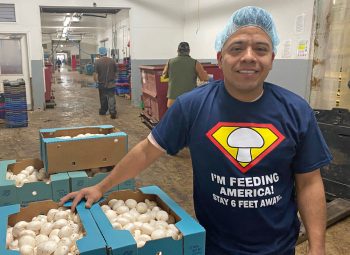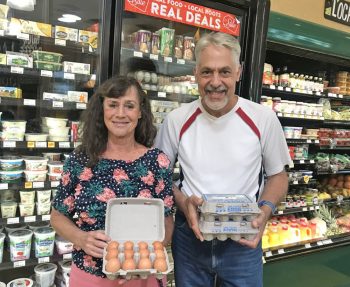
Alejandro Romero, an employee at Pietro Industries in Kennett Square, wearing a specially created t-shirt that reminds Pietro staff, and the community, that agriculture employees are heroes, performing essential jobs that keep us fed even during difficult times.
The COVID-19 pandemic has challenged our nation in so many profound ways, and agriculture, an essential business in every way, has been no exception.
From owner-operators of small, suburban produce farms to commodity crop farms on thousands of acres – all have had to rethink their business models and add extra safety measures because of the coronavirus for their families, staff and customers, often requiring extra expertise and expense.
“Chester County’s agricultural industry has always been incredibly strong. We rank second among Pennsylvania’s 67 counties, and place 53rd among the 3,000-plus counties nationwide in the total value of agricultural products sold,” said Chester County Commissioners’ Chair Marian Moskowitz. “That equates to a $712 million industry.”
COVID-19’s impact on Chester County’s farming businesses has been significant.
For Chester County egg farmers Deb Ellis and Duane Rehmeyer of Highspire Hills Farm in Glenmoore, the pandemic cost them a majority of their restaurant clients and a large part of their income. Despite increasing demand from their grocery store clients like Crop’s Fresh Marketplace and Kimberton Whole Foods, Deb and Duane were left with a large number of eggs they were unable to sell and feed bills to pay.
“Chickens don’t read the paper; they don’t stop laying in a pandemic,” said Ellis.
With help from some partner organizations, Ellis and Rehmeyer looked to social media. They had always had a presence online, but hadn’t needed to focus on it much. After a couple well-received Facebook posts about their egg surplus, the couple were surprised to receive an avalanche of new customers to their small, on-farm store.
“Normally, we might have a few cars a day, but now we have upwards of 40 to 50 cars coming down the driveway to buy our eggs, “says Ellis. “We are grateful to all of our friends and neighbors for their support and are thankful that we have the ability to support our local community.”
Farmers markets, a traditional marketing channel for farmers for centuries, have also changed in response to COVID-19.
“Chester County’s farmers markets are a great source for locally-grown meats, vegetables, cheeses, yogurt and honey – some even year-round,” Chester County Commissioner Josh Maxwell said. “But just like many other Chester County industries, because of COVID-19 our farmers market operators have had to be creative to continue to safely serve their customers.”
Many Chester County farmers markets now prefer customers order online and pay in advance to avoid customers congregating in and around vendor booths. The increased social distancing is good for public health, but it has put a stop to browsing and face-to-face conversations with customers, both proven to increase farm sales.
In response, farmers market vendors Sammy Smenkowski and Zac Heacock of Full Circle CSA in Glenmoore chose to open up more spots in their CSA program (community-supported agriculture). In a CSA program, customers pay in advance to receive farm products throughout the growing season.
“We nearly doubled the size of our CSA from last season to not only attempt to meet high demand and feed as many people in our community as possible, but to make up for lost revenue due to markets running very differently and restaurants being closed or limited with sales,” said Smenkowski.
“We have and will continue to use strict good hygiene protocol and to come up with creative, safe ways to get food to people’s homes,” she adds.
Increased safety is the name of the game for small operations like Full Circle, up to and including large operations employing hundreds like mushroom giant Pietro Industries in Kennett.
The mushroom industry has always been an innovator when it comes to designing and implementing safety protocols, but the pandemic has caused them to add additional measures beyond their usual practices. It also amplified their ongoing workforce shortage and caused the loss of major clients like restaurant, university and cruise ship food service companies.
Chris Alonzo of Pietro Industries in Kennett Square (and Chester County Agricultural Development Council Board Chair) has seen a positive employee response to the new measures on his farm including TV monitors playing safety messages in Spanish, increased conversation with employees about their health and his new t-shirt campaign.
The shirts feature a Superman style logo with a mushroom in the center and the slogan “I’m feeding America, please stay 6 feet away.”
“I wanted to help keep my employees safe and remind our larger community that agriculture employees are heroes, performing essential jobs that deserve our recognition and appreciation,” says Alonzo.
As many farmers will tell you, COVID-19 is far from the only crisis they have had to manage over the years to keep our grocery shelves fully stocked. Unpredictable weather, employee shortages and invasive pests are no picnic either.
“If nothing else, this pandemic has proven that a robust local food system is a necessity, not a luxury, and it deserves our steadfast support,” says Chester County Commissioner Michelle Kichline. “Remember, when you buy Chester County grown farm products today, you are helping to insure farmers will be able to keep growing for us tomorrow. We are all in this together.”





